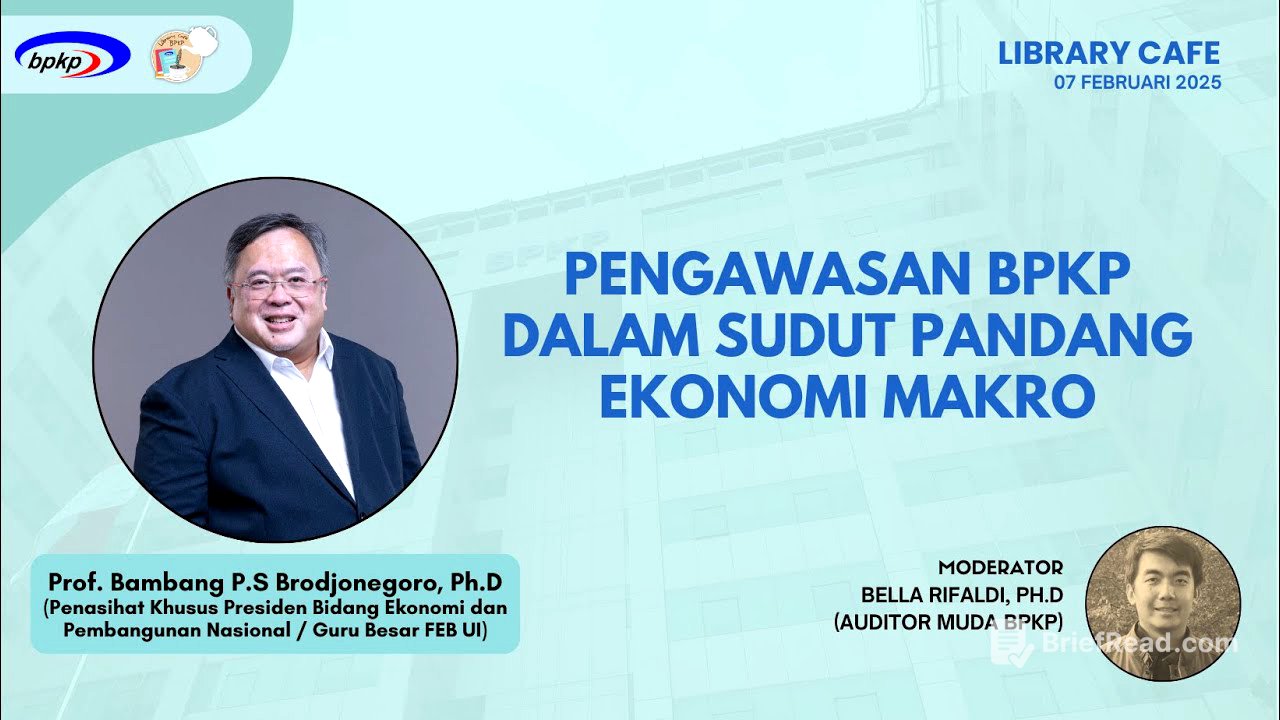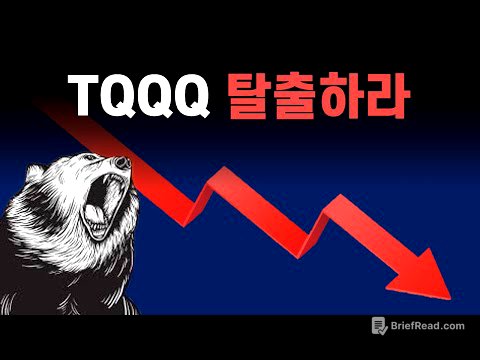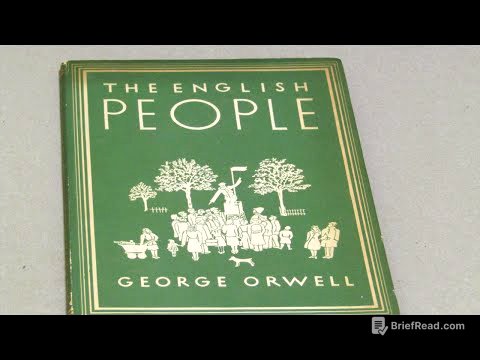TLDR;
This YouTube video features a seminar hosted by the Library Cafe BPKP, focusing on enhancing the role of BPKP (Financial and Development Supervisory Agency) in overseeing national economic development through a macroeconomic perspective. Key points discussed include:
- The importance of BPKP in providing insights for macroeconomic policies.
- The need for BPKP to shift from micro-operational oversight to influencing macro policies.
- The significance of understanding economic indicators like GDP and GNP in assessing the impact of BPKP's work.
- Strategies for BPKP to improve data accuracy and consistency to better inform policy decisions.
Intro [0:01]
The video opens with a musical performance.
Opening Remarks and Introductions [3:02]
The host welcomes Prof. Dr. Bambang Brodjonegoro, special advisor to the president in economics and national development, along with other BPKP officials. The seminar's theme is "Pengawasan BPKP dalam Sudut Pandang Ekonomi" (BPKP Oversight in Economic Perspective). The goal is to share knowledge to aid auditors in financial and development oversight.
Opening Speech by Agustina Arumsari [4:43]
Agustina Arumsari expresses gratitude to Prof. Bambang for being an "influencer" at the event, which is designed as a relaxed "library cafe" setting for knowledge sharing. The event is broadcasted to 36 BPKP representatives across Indonesia. BPKP is evolving its oversight from micro-operations to macro-policy impacts, aiming to advise the President and ministers. She seeks insights on the role of oversight in macro policies, referencing Prof. Bambang's extensive government experience. She highlights the need to improve policy implementation, using the example of the 3-kilogram LPG subsidy policy. She hopes the session will refine BPKP's oversight to better contribute to government policy-making.
Discussion Introduction [10:47]
The host introduces the discussion topic: BPKP's oversight from an economic perspective. The government targets 8% economic growth from 2024-2029, up from 5% in 2022-2024. BPKP's role as an internal auditor is crucial in achieving this, providing recommendations for economic policies. Auditors need a macroeconomic viewpoint. B. Rivaldi, PHD, will moderate, and Prof. Bambang Brodjonegoro will present.
Presentation by Prof. Bambang Brodjonegoro [14:41]
Prof. Bambang expresses appreciation for the invitation and shares his initial understanding of BPKP as the government's internal auditor, similar to internal audit roles in BUMNs and private companies. He recalls his early task as Minister of Finance to select the head of BPKP, highlighting the importance of the role and its alignment with the President. He emphasizes the significance of "pembangunan" (development) in BPKP's name, distinguishing it from BPK's (State Audit Board) external audit focus. "Pembangunan" implies a macroeconomic scope, including poverty reduction, inequality reduction, and international trade. He suggests focusing on achieving RPJMN targets like poverty and inequality reduction, rather than solely pursuing 8% growth, which is subject to external factors.
External Economic Factors and Globalisation [20:44]
He discusses unpredictable external factors, such as Trump's policies, impacting macroeconomics. He notes Trump's unique approach of imposing tariffs on China, Canada, and Mexico. He explains the trend of globalization and free trade, driven by the economic principle of specialization.
Historical Context of Indonesian Economy [24:29]
He explains why rice is Indonesia's staple food due to the suitability of paddy cultivation in Java. He discusses the historical context of economic development in Java, driven by Dutch agricultural interests, leading to infrastructure like railways primarily serving Java. He criticizes the over-concentration of economic activity in Java, leading to inequality.
Industrialization and Food Security [30:51]
He notes Indonesia once achieved 8% growth through industrialization in the 1990s. He points out that industrial and residential areas in Bekasi and Tangerang were built on fertile agricultural land, impacting food security. He questions the feasibility of developing rice estates in Kalimantan or Papua, referencing the historical success of paddy cultivation in Java.
International Trade and Food Security [34:57]
He explains why Indonesia cannot produce all types of food, such as wheat, necessitating international trade. He urges BPKP to incorporate a macroeconomic perspective, particularly concerning development, in their internal audits.
Macroeconomics and GDP [36:47]
He defines macroeconomics as the study of the behavior of an economy, contrasting it with microeconomics. He stresses the importance of understanding regional economies for BPKP representatives in provinces. He clarifies that an "economy" doesn't necessarily equate to a country, citing examples like Taiwan and Hong Kong in APEC. He explains the significance of GDP (Gross Domestic Product) as a key economic indicator, updated quarterly by BPS (Statistics Indonesia).
GDP vs GNP [42:21]
He differentiates between GDP and GNP (Gross National Product). GDP measures economic activity within a country's borders, regardless of who performs it. GNP measures economic activity by a country's nationals, regardless of location. He explains why BPS releases GDP data more readily than GNP data. He notes that Indonesia's GDP is larger than its GNP, indicating more foreign economic activity in Indonesia than Indonesian activity abroad. He contrasts this with Singapore, where GNP is likely higher than GDP.
Economic Activities and GDP [48:20]
He explains that economic activity involves income and expenditure. He uses the COVID-19 pandemic as an example of how reduced spending can contract the economy. He emphasizes that BPKP's audits should consider the impact on GDP and economic activity.
Circular Flow and Fiscal Policy [52:29]
He describes the circular flow of the economy, involving government, households, and firms. He explains the role of fiscal policy and APBN (state budget) in redistributing wealth through taxes and government spending. He differentiates between direct assistance (Bansos) and indirect assistance (infrastructure).
Approaches to Calculating GDP [57:49]
He outlines three approaches to calculating GDP: production, expenditure, and income. He notes that BPS primarily uses the production and expenditure approaches due to data availability. He explains how GDP can be viewed based on sectors (primary, secondary, tertiary) and how this reflects a country's economic development stage.
GDP Calculation: Production and Expenditure [1:00:39]
He explains the production approach to GDP calculation, which involves summing the value added by each sector of the economy. He also explains the expenditure approach, which involves summing consumption, investment, government spending, and net exports.
GDP Calculation: Income Approach and Informal Sector [1:04:30]
He explains the income approach to GDP calculation, which involves summing wages, profits, and rent. He notes the difficulty in accurately calculating GDP using the income approach in Indonesia due to the large informal sector. He uses the example of domestic helpers (ART) and street vendors (angkringan) to illustrate the challenges in accounting for informal economic activities.
Formal vs Informal Economy [1:09:17]
He contrasts the formal and informal economies, using examples like locksmiths and construction workers in Australia versus Indonesia. He explains why tax ratios are low due to the large informal sector. He notes that gini coefficient in Indonesia is underestimate because it's based on expenditure.
Policy Instruments [1:18:19]
He discusses policy instruments: fiscal policy, monetary policy, and trade policy. He explains the importance of understanding monetary policy and its impact on interest rates. He emphasizes the importance of trade policy, particularly import tariffs, and the need to protect domestic industries.
Trade Policy and Import Tariffs [1:20:47]
He discusses the role of import tariffs in protecting domestic industries, referencing the textile industry and the impact of textile imports. He explains concepts like dumping and predatory pricing. He highlights the importance of preventing smuggling, using the example of illegal used clothing imports in Sumatra.
Investment and Economic Growth [1:31:09]
He emphasizes that investment, not consumption, drives economic growth. He notes that investment creates jobs and reduces poverty. He suggests BPKP focus on investment-related oversight. He presents data showing Indonesia's economic growth in 2024 at 5.03%, highlighting the role of commodity prices.
Economic Growth and Investment Data [1:34:58]
He analyzes data on economic growth and investment, noting that Indonesia's growth is often driven by commodity prices. He points out that investment growth is relatively low, hindering higher economic growth. He notes that investment is primarily in mining and services, rather than manufacturing.
Manufacturing and Reindustrialization [1:45:47]
He emphasizes the need to shift towards manufacturing for sustained economic growth. He discusses the concept of reindustrialization, focusing on adding value to commodities. He uses the examples of nickel and CPO to illustrate the potential for value-added industries. He urges BPKP to review industrialization policies to ensure they align with this concept.
Housing Program and Policy Review [1:52:32]
He highlights the importance of the 3 million homes program and the need for BPKP to review its implementation. He emphasizes that the multiplier effect of the Real Estate sector is very high. He suggests BPKP review regulations to ensure they don't hinder investment.
Data Accuracy and Infrastructure [1:56:14]
He stresses the importance of data accuracy, particularly non-statistical data from ministries and agencies. He highlights the issue of inconsistent data on rice production. He discusses the problem of underutilized airports, urging BPKP to evaluate the planning and feasibility of infrastructure projects.
Infrastructure and Planning [2:03:35]
He discusses the issue of underutilized airports, urging BPKP to evaluate the planning and feasibility of infrastructure projects. He uses the example of Kertajati airport and the proposed VVIP airport in IKN (new capital city) to illustrate the importance of proper planning. He concludes by emphasizing the importance of BPKP in overseeing development and ensuring that it contributes to reducing poverty and inequality.
Closing Remarks [2:09:48]
Prof. Bambang concludes by expressing his excitement about the discussion and his hope that it has helped bridge the gap between accounting and economics perspectives.
Musical Performance [2:10:40]
A musical performance is showcased.
Discussion and Q&A [2:15:14]
The session transitions to a discussion and Q&A segment.
Question from Agustina Arumsari [2:15:45]
Agustina Arumsari asks about Shadow economy and illegal mining.
Question from Mas Ar [2:20:57]
Mas Ar asks how auditors can convince stakeholders of the economic impact of delays and underutilization, and how to use economic tools.
Question from Pak sfral [2:24:44]
Pak sfral asks for insights on strategic recommendations to improve tax revenue, reduce tax gap, and address the informal economy.
Prof. Bambang's Response [2:28:51]
Prof. Bambang emphasizes BPKP's strength in data accuracy and consistency, combined with their ability to interpret regulations. He suggests focusing on data from KL (ministries/agencies) and checking for consistency. He recommends using proxies, such as electricity consumption, to detect informal economic activity. He reiterates the importance of location in the 3 million homes program. He suggests BPKP work closely with the evaluation unit in Bappenas.
Question from Pak Supriadi [2:47:34]
Pak Supriadi asks about the ideal level of VAT (Value Added Tax) on essential goods.
Question from Pak Sindu [2:49:18]
Pak Sindu asks about the government's approach to developing UMKM (Micro, Small, and Medium Enterprises) and how other countries handle UMKM development.
Prof. Bambang's Response [2:51:29]
Prof. Bambang suggests that a good tax structure should be based on income tax. He says that compliance with income tax is more important than increasing VAT. He says that UMKM should be part of the supply chain and should be digitalized.
Closing [2:59:14]
The session is closed.









